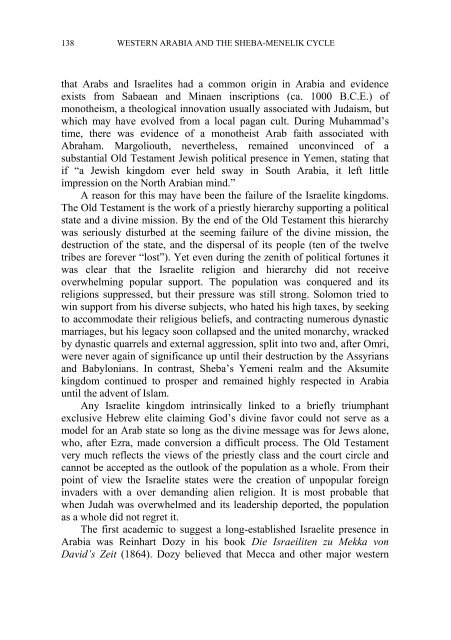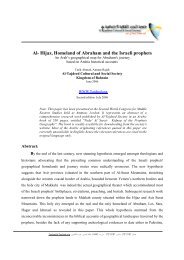Sheba
Sheba
Sheba
Create successful ePaper yourself
Turn your PDF publications into a flip-book with our unique Google optimized e-Paper software.
138<br />
WESTERN ARABIA AND THE SHEBA-MENELIK CYCLE<br />
that Arabs and Israelites had a common origin in Arabia and evidence<br />
exists from Sabaean and Minaen inscriptions (ca. 1000 B.C.E.) of<br />
monotheism, a theological innovation usually associated with Judaism, but<br />
which may have evolved from a local pagan cult. During Muhammad’s<br />
time, there was evidence of a monotheist Arab faith associated with<br />
Abraham. Margoliouth, nevertheless, remained unconvinced of a<br />
substantial Old Testament Jewish political presence in Yemen, stating that<br />
if “a Jewish kingdom ever held sway in South Arabia, it left little<br />
impression on the North Arabian mind.”<br />
A reason for this may have been the failure of the Israelite kingdoms.<br />
The Old Testament is the work of a priestly hierarchy supporting a political<br />
state and a divine mission. By the end of the Old Testament this hierarchy<br />
was seriously disturbed at the seeming failure of the divine mission, the<br />
destruction of the state, and the dispersal of its people (ten of the twelve<br />
tribes are forever “lost”). Yet even during the zenith of political fortunes it<br />
was clear that the Israelite religion and hierarchy did not receive<br />
overwhelming popular support. The population was conquered and its<br />
religions suppressed, but their pressure was still strong. Solomon tried to<br />
win support from his diverse subjects, who hated his high taxes, by seeking<br />
to accommodate their religious beliefs, and contracting numerous dynastic<br />
marriages, but his legacy soon collapsed and the united monarchy, wracked<br />
by dynastic quarrels and external aggression, split into two and, after Omri,<br />
were never again of significance up until their destruction by the Assyrians<br />
and Babylonians. In contrast, <strong>Sheba</strong>’s Yemeni realm and the Aksumite<br />
kingdom continued to prosper and remained highly respected in Arabia<br />
until the advent of Islam.<br />
Any Israelite kingdom intrinsically linked to a briefly triumphant<br />
exclusive Hebrew elite claiming God’s divine favor could not serve as a<br />
model for an Arab state so long as the divine message was for Jews alone,<br />
who, after Ezra, made conversion a difficult process. The Old Testament<br />
very much reflects the views of the priestly class and the court circle and<br />
cannot be accepted as the outlook of the population as a whole. From their<br />
point of view the Israelite states were the creation of unpopular foreign<br />
invaders with a over demanding alien religion. It is most probable that<br />
when Judah was overwhelmed and its leadership deported, the population<br />
as a whole did not regret it.<br />
The first academic to suggest a long-established Israelite presence in<br />
Arabia was Reinhart Dozy in his book Die Israeiliten zu Mekka von<br />
David’s Zeit (1864). Dozy believed that Mecca and other major western




